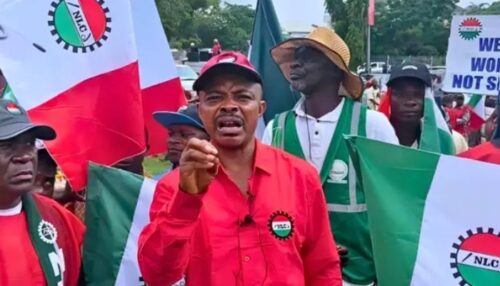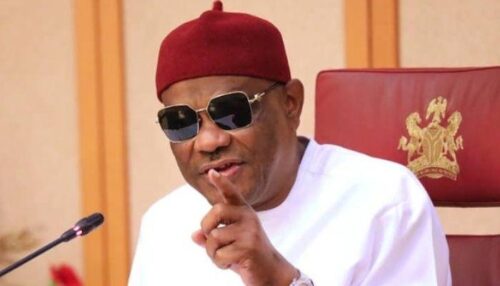The Governor of the Central Bank of Nigeria (CBN), Godwin Emefiele, has been funding “unknown gunmen” and members of the outlawed Indigenous People of Biafra (IPOB), the State Security Service (SSS) has alleged in court documents newly obtained by Premium Times.
The documents provide, for the first time, the missing details of the terrorism financing allegation which the SSS levelled against Mr Emefiele last December.
IPOB is a separatist organisation that calls for the secession of the five Igbo-dominated states in South-east Nigeria and parts of neighbouring states as an independent Biafra nation.
The group blamed for violent acts in the South-east region in recent years has been declared a terrorist organiation and proscribed by a court as far back as September 2017.
The Nigerian media, including PREMUM TIMES, reported in December SSS’ futile bid to obtain an order of the Federal High Court in Abuja for the arrest of Mr Emefiele over wide-ranging allegations, including financing of terrorism.
The Chief Judge of the Federal High Court, John Tsoho, after listening to SSS’ legal team, refused to grant the application for an order against Mr Emefile.
The judge rejected the application in a ruling delivered on 9 December, citing an irregularity in the procedure adopted by the SSS in its application.
The Nigerian media only became aware of the ruling 11 days after it was delivered by the court.
But the reports did not provide details about the agency’s weighty allegations against Mr Emefiele.
Eight weeks after the court gave the decision, Premium Times has now obtained the SSS’ court filings providing astonishing dimensions of the agency’s allegations against the CBN governor.
In a slew of weighty allegations, the SSS accused him of sabotaging the President Muhammadu Buhari administration, financing terrorism, aiding and abetting terrorism, and committing other economic crimes with effect of undermining Nigeria’s national security.
More specifically, the agency also accused Mr Emefiele of mismanaging the CBN subsidiary, NISRAL, and the central bank’s Anchor Borrowers Programme.
Call for detention
Ateam of four lawyers from the SSS’ legal department filed its case against Mr Emefiele on 7 December.
But contrary to earlier reports suggesting that the application was for an order for the arrest of Mr Emefiele, it actually sought permission to detain Mr Emefile for 60 days to conclude an ongoing investigation of his alleged atrocities.
The application was filed as an ex parte motion, meaning it was not served on Mr Emefile.
It was supported by an affidavit deposed to by an SSS official, Umar Salihu, who summarised the details of the investigations into the weighty crimes Mr Emefiele allegedly committed.
The deponent said “there is reasonable suspicion that the respondent (Mr Emefiele) was involved in terrorism financing, aiding and abetting acts of terrorism, economic crimes of national security dimension and for undermining the security of the Federal Republic of Nigeria.”
He said the agency needed to apply to the court “for an order enabling the applicant to detain the respondent for sixty days, pending the conclusion of ongoing investigation …”
On the need for the court to issue the order, he said Mr Emefiele “is a man of means and can easily evade arrest and interfere with ongoing investigation if he is released on bail.”
Citing “credible intelligence”, the deponent mentioned some specific allegations over which the agency was investigating Mr Emefiele.
The allegations enumerated in the application lack specifics or any hint at what the CBN governor’s motivation to sponsor IPOB and other terrorists’ activities could be.
IPOB, terrorism funding
In about the most horrific of the allegations, the SSS accused Mr Emefiele of funding terrorism, unknown gunmen terrorising the South-east region, the IPOB and its armed wing, the Eastern Security Network (ESN).
The SSS alleged that Mr Emefiele funded them with both the resources he raised for his failed presidential bid last year and funds diverted from government coffers.
Mr Emefiele, as sitting CBN governor, controversially bidded for the presidential ticket of the All Progressives Congress (APC) last year. Images of his branded vehicles and other campaign materials surfaced online in the lead-up to the party’s primary election.
He also approached the Federal High Court in Abuja to obtain an order affirming his right to jostle for the APC’s ticket. But the court on 9 May refused to grant Mr Emefiele’s prayer.
The Nigeria’s spy agency said in its filing in December that Mr Emefiele “procures a number of vehicles and disbursed funds for his botched presidential ambition.”
It added that “the said funds and vehicles are being channelled into funding of Unknown Gunmen, Eastern Security Network (ESN) and elements of IPOB, a proscribed organisation.”
In addition, the agency said Mr Emefiele, “on several occasions in actions prejudicial to the security of the Nigerian state,” engaged in “criminal conspiracy to divert government resources into suspicious acts of terrorism financing”.
It said the actions of the CBN governor were “meant to subvert and sabotage” the President Muhammadu Buhari administration.
But as weighty as the allegations, coming from the government’s flagship intelligence agency are, Mr Buhari has continued to hold one-on-one meetings with Mr Emefiele since December. This raises questions about whether the president has any regard for the “credible intelligence” the SSS claimed it gathered about the nation’s top banker.
The SSS, which is at the forefront of government’s efforts to quell separatist activities around the country, was holding the leader of IPOB, Nnamdi Kanu, in custody when it linked Mr Emefiele to the funding of the proscribed group in December.
Neither the Presidency, the SSS nor Mr Emefiele has commented on the allegations.
Money laundering, fraud, mismanagement of interventionist funds
The SSS also accused Mr Emefiele of “fraud, money laundering, round tripping and conferment of financial benefit to self and others.”
Mr Emefiele is also involved in mismanaging of various interventionist funds of the government under his control, according to the SSS.
Funds belonging to the Social Investment Programme (NISRAL) and the Anchor Borrowers Scheme were among those the SSS accused Mr Emefiele of mismanaging. The two agencies are interventionist schemes to boost food production and encourage farmers.
The SSS also accused Mr Emefiele of mismanaging “other key economic sectors of the economy”.
‘Emefiele’s syndicate’
In another breathtaking allegation, the SSS claimed it was on the trail of members of a criminal syndicate of which Mr Emefiele is allegedly a part.
It said “investigation is still ongoing on a wider scale as other members of the syndicate chain need to be identified and arrested to enable successful prosecution.”
The agency accused Mr Emefiele of aiding and abetting terrorism, and alleged further that he used proxies from his alleged syndicate “to carry out his illegal economic crimes of national security dimension with potent threat to the country’s security.”
Why court rejected SSS’ application
In rejecting SSS’ application on 9 December 2022, however, the judge, Mr Tsoho, pointed out a flaw in the procedure adopted by the agency to ask for an order for Mr Emefiele’s detention for 60 days.
He said the request by the secret police ought to have been preceded by the arrest of the suspect which did not require a court order.
“This is not the situation here, as Godwin Emefiele, the CBN governor was shown on television, even last night, having an audience with the President of Nigeria,” the judge said. “It therefore seems that the applicant intends to use the court as a cover for an irregular procedure which is unacceptable.”
The judge said “an application of this kind (by the SSS) should have evidence of the approval of the respondent (Emefiele’s) boss (President Buhari), that such measures are authorised to be taken,” owing to the “sensitive position” he “occupies…as one of the key drivers of the nation’s economy.”
“I decline to grant this application ex parte,” the judge declared.
Femi Falana, a Senior Advocate of Nigeria, said the SSS’ allegations against Mr Emefiele robs Nigeria of investors’ confidence in the economy.
“Nobody will want to do business with your country when the head of the Central Bank is a terrorism suspect,” the senior lawyer said in a telephone interview with Premium Times.
Similarly, Mr Emefiele’s predecessor, Lamido Sanusi, a former Emir of Kano, was accused of terrorism financing by the Goodluck Jonathan-led regime in 2014, and was removed from office, Mr Falana recalled.
Also commending the judge for dismissing what he termed, “the unworthy application by the SSS to arrest the CBN governor,” Olisa Agbakoba, a former President of the Nigerian Bar Association (NBA), challenged the secret police to sue Mr Emefiele if “there is evidence.”
CBN governor and his troubles
Mr Emefiele’s foray into politics last year, bidding for the APC’s presidential ticket while still in office as the CBN governor, drew wide condemnation among Nigerians.
A Premium Times editorial, one of the credible forces that first exposed Mr Emefiele’s covert presidential bid, called on him to either publicly deny it or resign immediately from office to pursue his political dream.
The CBN still faces criticisms for plunging Nigerians into hardships associated with scarcity of the newly introduced naira notes. Nigerians, groaning over the scarcity of new naira notes, urged the CBN governor to rescind the policy.
The redesigned 200, 500 and 1000 notes are hard to come by at Automated Teller Machines – the only place where money can be withdrawn.
But Mr Emefiele only extended the deadline by 10 days from 31 January to 10 February, which many have said is insufficient to address the acute shortage of the new notes.
The presidential candidate of the APC, Bola Tinubu, in a veiled reference to the monetary policy, condemned the scarcity of the new bank notes, adding that it was a ploy to scuttle his chances of winning the election.
Appearing before the House of Representatives, Mr Emefiele explained that old naira notes would be accepted by banks even after the 10 February deadline.
A law professor, Joshua Alobo, had sued the CBN seeking an extension of the deadline.
The apex bank had on 26 October, 2022, announced the introduction of redesigned 200, 500 and 1,000 naira notes into the financial system.
But access to the new notes remains a herculean task as people throng ATMs in a bid to withdraw money.
Credit: Premium Times
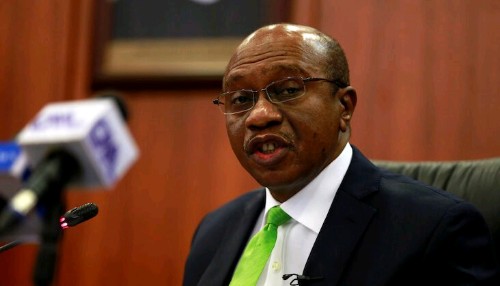
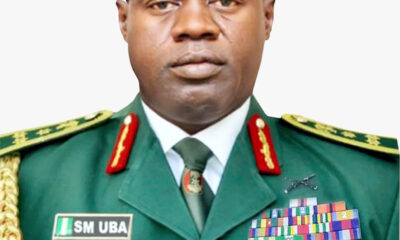
 BIG STORY3 days ago
BIG STORY3 days ago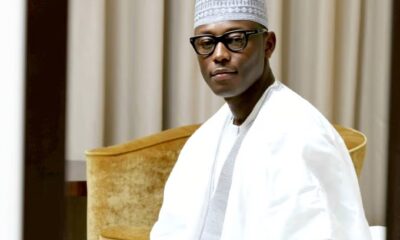
 BIG STORY3 days ago
BIG STORY3 days ago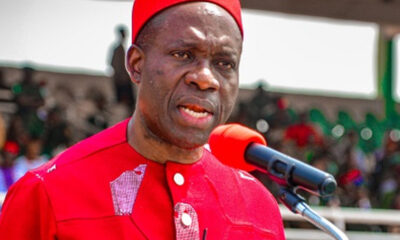
 BIG STORY3 days ago
BIG STORY3 days ago
 BIG STORY3 days ago
BIG STORY3 days ago
 BIG STORY3 days ago
BIG STORY3 days ago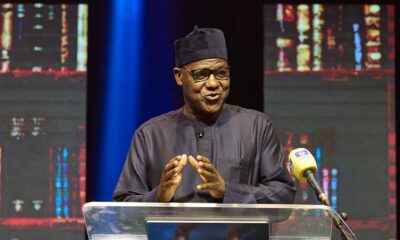
 BIG STORY3 days ago
BIG STORY3 days ago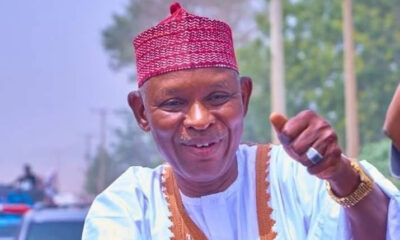
 POLITICS3 days ago
POLITICS3 days ago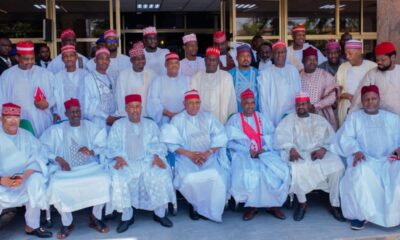
 POLITICS3 days ago
POLITICS3 days ago



















